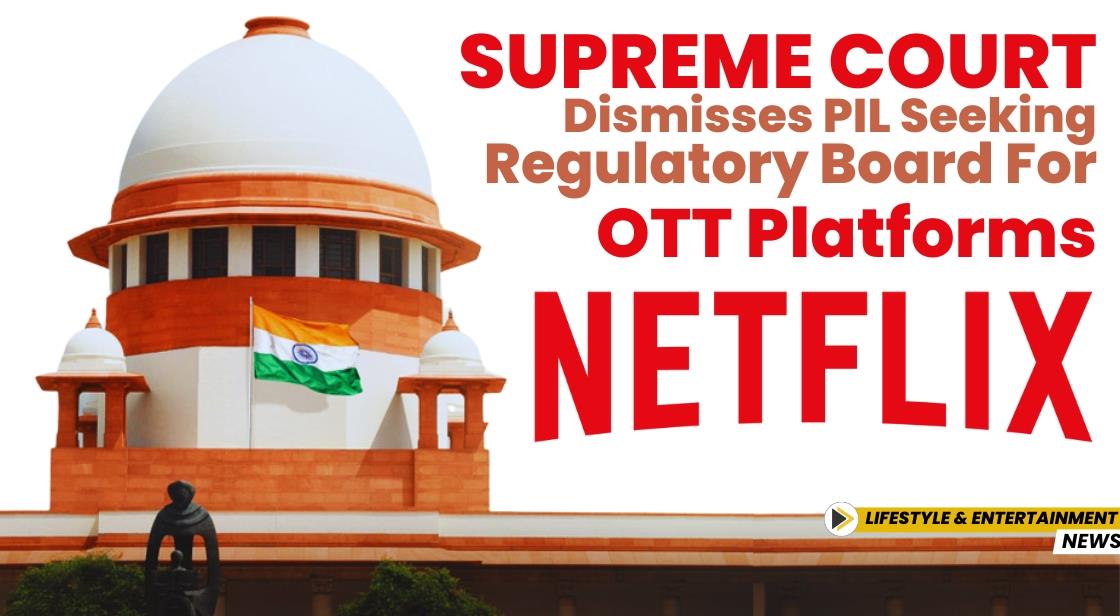Supreme Court Dismisses PIL Seeking Regulatory Board for OTT Platforms

News Synopsis
The Supreme Court of India has dismissed a Public Interest Litigation (PIL) requesting the establishment of a regulatory authority to oversee content on Over-The-Top (OTT) streaming platforms. These platforms, such as Netflix, Amazon Prime, and Disney+ Hotstar, have gained significant popularity in India, offering an array of content including films, series, documentaries, and more.
The petitioners argued that unlike traditional media like television and cinema, these platforms operate without strict regulatory checks, which they claim results in the dissemination of unfiltered, potentially harmful content.
The PIL's Argument: A Call for Oversight on OTT Platforms
Focus on Netflix Series "IC 814: The Kandahar Hijack"
The PIL, filed by Shashank Shekhar Jha and Apurva Arhatia in September, brought attention to the Netflix series IC 814: The Kandahar Hijack. The petitioners argued that the series misrepresents the historical events surrounding the 1999 Kandahar plane hijacking, a traumatic event that left a lasting scar on India's security landscape.
They claimed the show downplays the hijackers' violence and distorts the tragedy by portraying the incident in a way that undermines the severity of terrorism. The petitioners also expressed concerns that the series vilifies the Hindu community and promotes a narrative that is harmful to India’s socio-political fabric.
Demand for a Regulatory Board
Petitioners’ Proposed "Central Board for Regulation and Monitoring of Online Video Contents"
The petitioners urged the Supreme Court to instruct the Central Government to establish an independent regulatory body, which they proposed to be named the "Central Board for Regulation and Monitoring of Online Video Contents". This board would oversee, monitor, and potentially censor content on various OTT platforms to ensure it complies with India's cultural, social, and legal standards.
They recommended that the board be led by a secretary-level IAS officer and include members from different fields, including film, media, law, and academia.
Ministries Involved in the Case
The petitioners also listed several prominent ministries and regulatory bodies as respondents in the PIL, including the Ministry of Information and Broadcasting, Ministry of Health and Family Welfare, Ministry of Women and Child Development, Ministry of Defense, and the Telecom Regulatory Authority of India (TRAI).
They argued that the lack of stringent regulations on OTT platforms compromises the constitutional rights outlined in Articles 14, 19, and 21 of the Indian Constitution, including the right to equality, freedom of expression, and right to life.
Supreme Court's Decision: No Change in OTT Oversight
Court’s Dismissal of the PIL
Despite the concerns raised by the petitioners, the Supreme Court decided not to entertain the PIL, leaving the current status of OTT platform regulation unchanged. The Court did not see merit in pursuing the establishment of a regulatory board for streaming services, citing that existing frameworks like the Information Technology (Intermediary Guidelines and Digital Media Ethics Code) Rules, 2021, already provide a structure for content regulation on digital platforms.
However, the dismissal of the PIL keeps the debate about OTT regulation alive, especially as streaming platforms continue to grow in popularity and influence.
Conclusion: Ongoing Debate on OTT Regulation in India
The Supreme Court’s decision not to pursue the creation of a regulatory board for OTT platforms marks a significant moment in the ongoing debate about content censorship and regulation in India. With the popularity of streaming services growing rapidly, the question of oversight remains unresolved for now. However, the conversation around regulating content on these platforms is likely to continue as more stakeholders call for clarity and control over the kind of material being streamed.
You May Like









